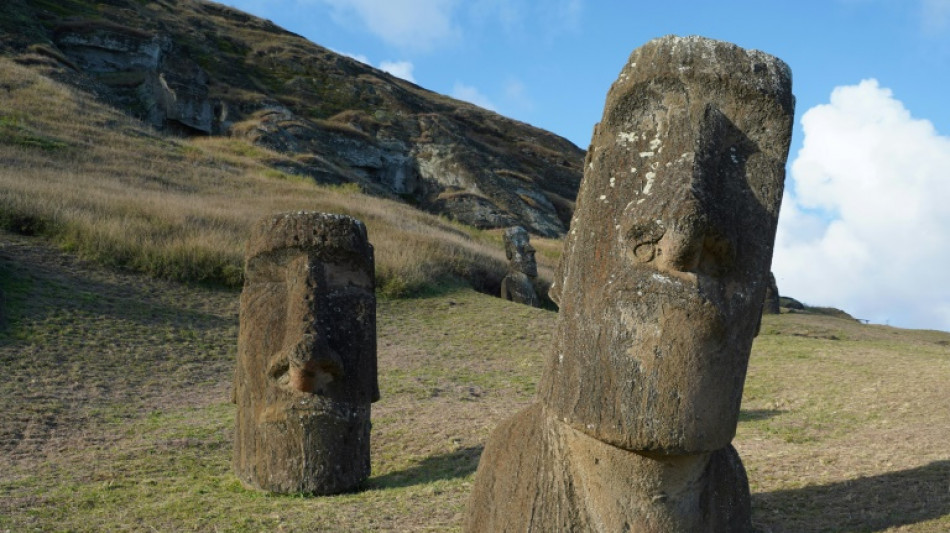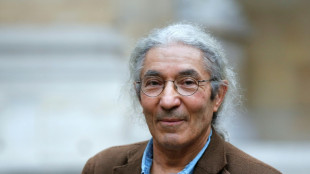
-
 Kohli blasts century as India declare against Australia
Kohli blasts century as India declare against Australia
-
Verstappen 'never thought' he'd win four world titles

-
 Former Masters champion Reed wins Hong Kong Open
Former Masters champion Reed wins Hong Kong Open
-
Awesome foursomes: Formula One's exclusive club of four-time world champions

-
 Smylie beats 'idol' Cameron Smith to win Australian PGA Championship
Smylie beats 'idol' Cameron Smith to win Australian PGA Championship
-
Five key races in Max Verstappen's 2024 title season

-
 Max Verstappen: Young, gifted and single-minded four-time F1 champion
Max Verstappen: Young, gifted and single-minded four-time F1 champion
-
'Star is born': From homeless to Test hero for India's Jaiswal

-
 Verstappen wins fourth consecutive Formula One world title
Verstappen wins fourth consecutive Formula One world title
-
Survivors, sniffing dogs join anti-mine march at Cambodia's Angkor Wat

-
 Far right eye breakthrough in Romania presidential vote
Far right eye breakthrough in Romania presidential vote
-
Jaiswal slams majestic 161 but Australia fight back in Perth

-
 Edinburgh's alternative tour guides show 'more real' side of city
Edinburgh's alternative tour guides show 'more real' side of city
-
IPL teams set to splash the cash at 'mega-auction' in Saudi Arabia

-
 Olympics in India a 'dream' facing many hurdles
Olympics in India a 'dream' facing many hurdles
-
Wounded Bangladesh protesters receive robotic helping hand

-
 Majestic Jaiswal 141 not out as India pile pain on Australia
Majestic Jaiswal 141 not out as India pile pain on Australia
-
Giannis, Lillard lead Bucks over Hornets as Spurs beat Warriors

-
 Juan Mata agent slammed as 'cowardly' by angry A-League coach
Juan Mata agent slammed as 'cowardly' by angry A-League coach
-
Marta inspires Orlando Pride to NWSL title

-
 Palestinian pottery sees revival in war-ravaged Gaza
Palestinian pottery sees revival in war-ravaged Gaza
-
Main points of the $300 billion climate deal

-
 Robertson wants policy change for overseas-based All Blacks
Robertson wants policy change for overseas-based All Blacks
-
Israel retreat helps rescuers heal from October 7 attack

-
 Afghan women turn to entrepreneurship under Taliban
Afghan women turn to entrepreneurship under Taliban
-
Mounting economic costs of India's killer smog

-
 At climate talks, painstaking diplomacy and then anger
At climate talks, painstaking diplomacy and then anger
-
Uruguayans head to polls with left hoping for comeback

-
 Trump's mass deportation plan could end up hurting economic growth
Trump's mass deportation plan could end up hurting economic growth
-
Iran director in exile says 'bittersweet' to rep Germany at Oscars

-
 US consumers to bargain hunt in annual 'Black Friday' spree
US consumers to bargain hunt in annual 'Black Friday' spree
-
Cheers, angst as US nuclear plant Three Mile Island to reopen

-
 Scientists seek miracle pill to stop methane cow burps
Scientists seek miracle pill to stop methane cow burps
-
Australia ditches plans to fine tech giants for misinformation

-
 Developing nations slam 'paltry' $300 bn climate deal
Developing nations slam 'paltry' $300 bn climate deal
-
Red Bulls win 'Hudson River derby' to reach conference final

-
 Neuville wins world title after Tanak crashes at Rally Japan
Neuville wins world title after Tanak crashes at Rally Japan
-
Neuville wins world rally title after Tanak crashes in Japan

-
 Colapinto cleared for Las Vegas GP despite heavy crash
Colapinto cleared for Las Vegas GP despite heavy crash
-
'Smiling One' Amorim vows he has ruthless streak Man Utd need

-
 Marseille down Lens to stay in touch with Ligue 1 leaders, Lyon draw
Marseille down Lens to stay in touch with Ligue 1 leaders, Lyon draw
-
New Zealand beat 'proud' Italy in Cane's Test farewell

-
 Barca collapse in Celta draw without Yamal, Simeone hits milestone
Barca collapse in Celta draw without Yamal, Simeone hits milestone
-
Thailand's Jeeno equals Yin for lead at LPGA Tour Championship

-
 New Zealand beat Italy in Cane's Test farewell
New Zealand beat Italy in Cane's Test farewell
-
Marseille down Lens to stay in touch with Ligue 1 leaders, Lyon held to draw

-
 Liga leaders Barca suffer late collapse in Celta draw
Liga leaders Barca suffer late collapse in Celta draw
-
Retegui fires Atalanta top of Serie A ahead of Inter

-
 Greaves hits maiden Test century as West Indies dominate Bangladesh
Greaves hits maiden Test century as West Indies dominate Bangladesh
-
Venezuela opposition calls for mass anti-Maduro protest on Dec. 1


'Ecocide' on Easter Island never took place, studies suggest
Two recent studies have cast doubt on a popular theory that the ancient residents of Easter Island suffered a societal collapse because they overexploited their natural resources, an event often labelled one of history's first "ecocides".
Easter Island, located in the Pacific Ocean 3,700 kilometres (2,300 miles) from the coast of Chile, is best known for the enigmatic "moai" stone statues of humans carved by the Rapanui people.
A widespread theory popularised by historians including US author Jared Diamond claimed that the Rapanui deforested the small island -- which is known to have once been covered in palm trees -- to keep supporting the flourishing culture of its more than 15,000 inhabitants.
The sudden lack of resources is said to have triggered a brutal period of famine and warfare that escalated into cannibalism and ended in a demographic and cultural collapse.
This event in the 1600s abruptly brought an end to the creation of new moai statues -- or so the story goes.
When Europeans first arrived at the island in 1722, they estimated there were only around 3,000 inhabitants.
This tale of ecological suicide -- or "ecocide" -- by the Rapanui "has been presented as a warning tale for humanity's overexploitation of resources," according to the authors of a study published in the journal Nature on Wednesday.
The international team of experts in population genetics tried to find signs of the societal collapse using an advanced statistical tool that reconstructs the genomic history of a people.
They analysed the genomes of 15 Rapanui who lived between 1670 and 1950 -- and found no sign of a societal collapse, which would have caused a sudden reduction in genetic diversity.
"Our genetic analysis shows a stably growing population from the 13th century through to European contact in the 18th century," said study author Barbara Sousa da Mota of the University of Lausanne.
"This stability is critical because it directly contradicts the idea of a dramatic pre-contact population collapse."
The research also shed light on contact between the island's residents and Native Americans well before Christopher Columbus arrived in the Americas -- another controversial moment in the history of the Polynesian people.
- Different method, same conclusion -
The new research reinforced the findings of a different study published in June in the journal Science Advances which took a very different approach.
That the two studies reached the same conclusion "shows the importance of looking at the same scientific question from different disciplines," Sousa da Mota told AFP.
The team behind the June study used satellite images to map out rock gardens on the island. Rock gardening is an agricultural method that involves mixing rocks into the soil to preserve nutrients and moisture.
Previous research had claimed that up to 21 square kilometres of the small island -- 12 percent of the total of 164 square kilometres -- was covered with these gardens, which would have been necessary to sustain more than 15,000 people.
- 'We can learn from them' -
But the US-based researchers determined that only 0.76 square kilometres of the island were used as rock gardens.
Such a small harvest of sweet potatoes -- essential to the Rapanui's diet -- from these gardens could not have supported more than 4,000 people, the researchers estimated.
That is close to the number of people that Europeans first found on the island, indicating there never was a society of 15,000 or more that endured a terrifying collapse.
"When we label an entire culture as an example of bad choices, or as a cautionary tale of what not to do, we had better be right, otherwise we feed stereotypes (which themselves have profound consequences on people)," Dylan Davis, a co-author of the Science Advances study, told AFP.
"In this case, the Rapanui managed to survive in one of the most remote places on Earth and did so fairly sustainably until European contact," said the environmental archaeologist at Columbia University.
"This suggests we can learn something from them about how to manage limited resources."
I.Meyer--BTB



